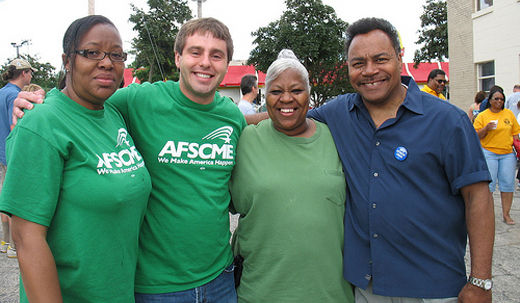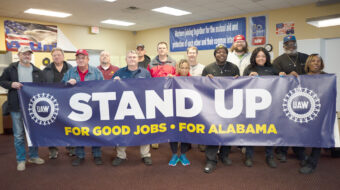
Recently I read with dismay an article by Mort Zuckerman, the editor of U.S. News & World Report, on the Huffingtonpost.com titled ‘Breaking the Public Sector Unions’ Stranglehold on State and Local Governments.’
First, that’s a whopper of a title, right? Secondly, the article has nothing at all to do with facts. When you start with a false premise (i.e. the union stranglehold) it is easier to lead readers to false conclusions (i.e. public sector workers are paid too much, have cushy pensions, health plans, etc.).
Let’s deal with Zuckerman’s claims one at a time.
The union stranglehold: Zuckerman claims, “The public sector unions organize voting campaigns for politicians who, on election, repay their benefactors by approving salaries and benefits for the public sector, irrespective of whether they are sustainable.” He continues, “These unions will naturally back a candidate willing to support better pay and benefits for their members.”
This, Zuckerman claims, perpetuates the unions’ stranglehold on state and local governments.
First, has Zuckerman been living in a cave? Seriously? Either he is incredibly naive, an idiot or a liar. His analysis is not only condescending. Even worse, it’s petty!
Of course public sector unions – all unions, all organizations, community groups, and don’t forget the corporations! – organize voting campaigns. Of course they support candidates who back their issues – higher pay, better benefits, etc. To think otherwise is idiocy! That’s the whole point! Don’t act shocked and surprised Zuckerman. It is disingenuous!
As Bart Simpson would say, ‘Duh!’
Additionally, we have to ask: Does organizing voting campaigns equal a stranglehold? Just because you organize a campaign doesn’t mean you win! Last I checked only a small percentage of union backed candidates actually make it into office! And when they do they are always in the minority. Stranglehold? I don’t think so!
Furthermore, where’s Zuckerman’s outrage regarding corporations and their voting campaigns? Aren’t they repaid with sweetheart contracts, tax breaks, loopholes and lax regulatory oversight? BP anyone? I’m sure the disaster in the Gulf Coast can be traced back to BP financed candidates who support off-shore drilling.
Additionally, Zuckerman adds, “Over recent decades public sector employment has exploded and public workers have come to dominate the labor movement.” However, the truth is far less dramatic. In fact, maybe Zuckerman should leave the drama to the cast of Glee.
A simple Google search of Bureau of Labor Statistics (BLS) reports shows that public sector union membership is currently at 7.9 million, while 7.4 million workers belong to unions in the private sector. A total of about 15.5 million workers belong to unions. The total U.S. work force is around 230 million. Obviously, both sectors are in a weakened position.
Do public sector workers make-up a larger share of the unionized work force? Yes, but they hardly dominate it. They have .5 percent more members than the private sector unions, and that is largely because of the recession. Has the percentage of the private sector unionized work force declined in recent years? Yes, but we’ve also been in the worst recession since the Great Depression and the private sector has lost millions of jobs, many of them union jobs in auto, steel, construction, etc. A decline in private sector employment doesn’t necessarily equal an explosion in public sector employment.
Common sense coupled with a Google search of BLS data discredits Zuckerman’s first claim.
The cushy pay and benefits: Through-out his article Zuckerman uses a lot of emotional rhetoric, but very little factual data. He insists that public sector workers have “extraordinary benefits,” “soaring pay,” “generous health insurance benefits” and “gold-plated perks.” But wait, don’t forget about the “multibillion-dollar unfunded liability” of union imposed “defined contribution” pension plans. He even goes so far as to claim that public sector workers are the “cushioned brethren” of private sector workers.
Now the facts: According to the BLS, the average pay for private-sector workers grew from $36,525 in 2001 to $46,708 in 2008. Pay for state employees trailed slightly, growing from $35,386 in 2001 to $43,540 seven years later. The most current data from the BLS indicates that the average pay for state employees today is about $50,000 – this includes executives, managers and union represented employees.
However, public sector unions don’t represent executives, managers and other higher paid job classifications. They represent low-pay workers – the people who run the Department of Social Services, the Unemployment Offices, the Medicaid and Medicare office, etc. The average pay, if executives and managers are excluded, would be considerably lower.
As to the so-called “extraordinary benefits” and “gold-plated perks,” all I have to say is this: If the union negotiated it and the state agreed to it, then it is a contract!
I believe in the sanctity of a contract. Maybe Zuckerman doesn’t. I don’t know. Maybe they don’t have contracts in that cave he’s been living in!
Photo: Public worker union members from AFSCME participate in 2008 Labor Walk in Wisconsin to mobilize union members to vote and educate them about the issues. Casie Yoder/AFL-CIO/CC/http://www.flickr.com/photos/labor2008/2603491739/

MOST POPULAR TODAY

High Court essentially bans demonstrations, freedom of assembly in Deep South

Zionist organizations leading campaign to stop ceasefire resolutions in D.C. area

U.S. imperialism’s ‘ironclad’ support for Israel increases fascist danger at home

UN warns that Israel is still blocking humanitarian aid to Gaza







Comments